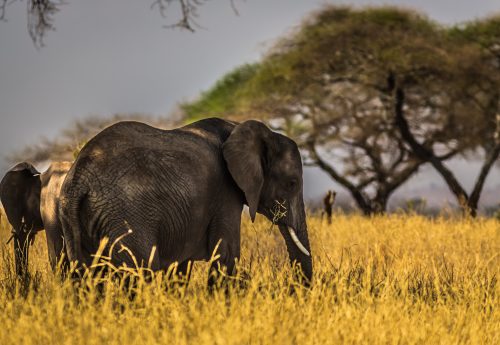
An elephant is a large and majestic animal, known for its size and strength. Elephants are large grey animals with big ears, long noses and white tusks. They are the largest living land mammals. Three living species are currently recognised: the African bush elephant, the African forest elephant, and the Asian elephant1. Elephants are the largest land mammals on earth and have distinctly massive bodies, large ears, and long trunks. They use their trunks to pick up objects, trumpet warnings, greet other elephants, or suck up water for drinking or bathing, among other uses2. Elephants need extensive land areas to survive and meet their ecological needs, which includes food, water, and space. On average, an elephant can feed up to 18 hours and consume hundreds of pounds of plant matter in a single day2. Here are some commonly asked questions about elephants and their detailed answers:
How much does an elephant weigh?
A: The weight of an elephant can vary depending on the species. On average, an adult African elephant weighs between 5,000 to 14,000 kilograms (11,000 to 31,000 pounds), while an adult Asian elephant weighs between 2,500 to 5,500 kilograms (5,500 to 12,000 pounds).
What are the different species of elephants?
A: There are two main species of elephants: the African elephant (Loxodonta africana) and the Asian elephant (Elephas maximus). The African elephant is further divided into two subspecies: the African forest elephant and the African savanna elephant.
What is the size of an elephant?
A: Elephants are the largest land animals. The height and size of an elephant can also vary based on the species. On average, African elephants stand between 3 and 4 meters (10 to 13 feet) tall at the shoulder, while Asian elephants are slightly smaller, ranging from 2 to 3.5 meters (6.5 to 11.5 feet) in height.
What do elephants eat?
A: Elephants are herbivores, meaning they primarily eat plants. Their diet mainly consists of grass, leaves, bark, branches, fruits, and roots. An adult elephant can consume around 150 kilograms (330 pounds) of food per day.
How long do elephants live?
A: Elephants have a relatively long lifespan. In the wild, African elephants can live up to 60-70 years, while Asian elephants can live up to 60 years or even longer in some cases. In captivity, elephants may live even longer due to the availability of regular healthcare and a controlled environment.
Do elephants have a good memory?
A: Yes, elephants are known for their exceptional memory. They have been observed to remember locations of water sources, migration routes, and even individual elephants they have encountered. Their long-term memory is believed to play a crucial role in their social interactions and survival.
How do elephants communicate?
A: Elephants communicate using a variety of vocalizations, body language, and infrasound. They produce sounds such as trumpeting, rumbling, and roaring to convey different messages. They also use visual cues such as ear movements, trunk gestures, and body postures to communicate with other elephants.
Are elephants endangered?
A: Yes, both African and Asian elephants are classified as endangered species. They face various threats, including habitat loss, poaching for ivory, and human-wildlife conflicts. Conservation efforts are ongoing to protect and preserve elephant populations and their habitats.
Can elephants swim?
A: Yes, elephants are excellent swimmers. They can use their trunk as a snorkel and paddle with their legs to move through water. Swimming also provides elephants with a way to cool down in hot climates and can be an enjoyable activity for them.
How do elephants cool themselves down?
A: Elephants have several methods to regulate their body temperature and cool themselves down. They often take mud baths and spray themselves with water or mud using their trunk. The moisture evaporates from their skin, providing a cooling effect. Additionally, elephants have large ears that help them dissipate heat by increasing the surface area for heat loss.
Leave a Reply Cancel reply